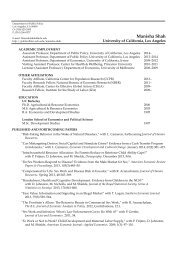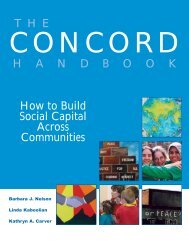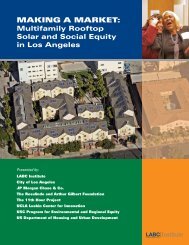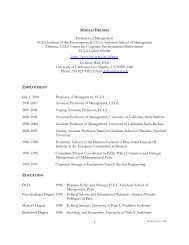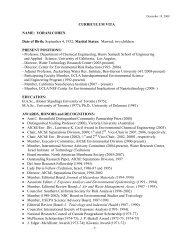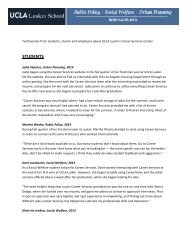Director's Report 2011.pdf - UCLA Luskin School of Public Affairs
Director's Report 2011.pdf - UCLA Luskin School of Public Affairs
Director's Report 2011.pdf - UCLA Luskin School of Public Affairs
You also want an ePaper? Increase the reach of your titles
YUMPU automatically turns print PDFs into web optimized ePapers that Google loves.
Sustainable Energy for California<br />
A coalition <strong>of</strong> business, environmental, and nonpr<strong>of</strong>it<br />
organizations led by the Los Angeles Business Council<br />
have launched a campaign to create a 600-megawatt solar<br />
feed-in tariff program in Los Angeles based on the <strong>Luskin</strong> Center’s<br />
research findings.<br />
The <strong>Luskin</strong> Center’s Sustainable<br />
Energy initiative analyzes and recommends<br />
strategies to effectively advance renewable<br />
energy and energy efficiency in California.<br />
During 2010, the <strong>Luskin</strong> Center focused on<br />
two ongoing research projects.<br />
First, J.R. DeShazo, <strong>Luskin</strong> scholar and<br />
Center director, and Ryan Matulka, project<br />
manager, led a high-pr<strong>of</strong>ile solar policy study<br />
commissioned by the Los Angeles Business<br />
Council and supported by a Solar Working Group<br />
consisting <strong>of</strong> leaders in the private, environmental,<br />
and education sectors. Providing data on the<br />
potential impact that regional solar power policies<br />
can have on Los Angeles’ renewable power<br />
sources, <strong>Luskin</strong> Center researchers mapped out<br />
an incentive plan to radically increase the use <strong>of</strong><br />
solar energy in the L.A. basin.<br />
The <strong>Luskin</strong> Center released two reports<br />
in the spring and summer <strong>of</strong> 2010: “Designing<br />
an Effective Feed-In Tariff for Greater Los<br />
Angeles” and “Bringing Solar Energy to Los<br />
Angeles: An Assessment <strong>of</strong> the Feasibility and<br />
Impacts <strong>of</strong> an In-Basin Solar Feed-In Tariff<br />
Program.” Based on these studies, a coalition<br />
<strong>of</strong> business, environmental, and nonpr<strong>of</strong>it<br />
organizations launched a campaign to create<br />
a 600-megawatt solar feed-in tariff program in<br />
Los Angeles. The <strong>Luskin</strong> Center–designed program<br />
would increase the generation <strong>of</strong> solar<br />
energy in the L.A. basin, decreasing the city’s<br />
dependence on fossil fuels and creating about<br />
11,000 new local jobs.<br />
Matthew Kahn, <strong>Luskin</strong> scholar and pr<strong>of</strong>essor<br />
in the Department <strong>of</strong> <strong>Public</strong> Policy, is<br />
working with a utility’s technical statistics staff<br />
on a range <strong>of</strong> empirical projects. The common<br />
theme across these projects is to reduce the<br />
greenhouse gas emissions from electricity<br />
consumption. Projects include 1) the determinants<br />
<strong>of</strong> household electricity consumption as a<br />
function <strong>of</strong> household demographics, envi-<br />
www.luskin.ucla.edu<br />
ronmental ideology, and the home’s physical<br />
attributes; 2) the determinants <strong>of</strong> commercial<br />
building electricity consumption as a function<br />
<strong>of</strong> building characteristics, the tenants who<br />
occupy the building, and the attributes <strong>of</strong> the<br />
building manager; 3) the economic returns to<br />
installing solar panels on residential homes;<br />
4) the electricity reduction impacts <strong>of</strong> home<br />
energy reports that show households their<br />
electricity consumption compared to their<br />
neighbors’ electricity consumption. The lessons<br />
learned will help determine the most effective<br />
ways to reduce greenhouse gas emissions from<br />
electricity consumption.<br />
Initiatives<br />
Initiatives 15



